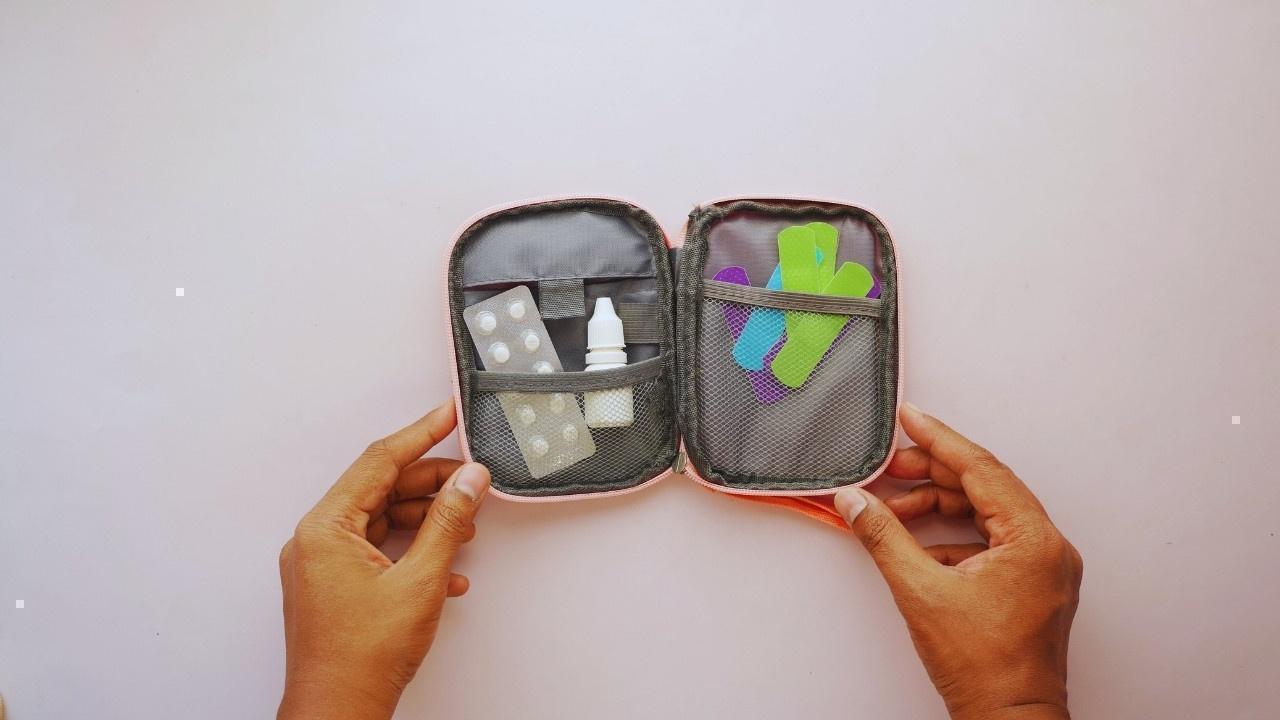You have not yet added any article to your bookmarks!

Join 10k+ people to get notified about new posts, news and tips.
Do not worry we don't spam!

Post by : Anis Farhan
Winter poses a heightened risk for respiratory illnesses, but this year's situation demands more caution. Reports indicate a surge in cases of influenza, RSV, and other viral infections that began earlier than normal, exacerbated by crowded travel hubs and changing weather patterns during the holiday season.
For those traveling, the implications are significant. Locations like airports and public transport become hotspots for germs, increasing risks even for short journeys. An effectively constructed health kit can safeguard against infections, alleviate symptoms, and mitigate travel disruptions.
Think of your winter travel health kit as a customized personal safety resource, ready to keep you healthy and comfortable no matter what unexpected challenges arise.
Understanding the various risks associated with winter journeys is crucial for assembling an effective health kit:
Increased respiratory illness due to dry indoor air and crowded conditions.
Cold temperatures can weaken the immune system, making you more susceptible to illness.
Rapid temperature shifts when transitioning from heated interiors to frosty outdoors may irritate the throat and affect breathing.
Exhaustion and lack of hydration during travel can diminish your body’s defenses.
Germ-infested surfaces and communal areas increase exposure to potential infections.
Equipping yourself with a proper health kit can help navigate these challenges effectively.
A winter health kit should be both compact and all-encompassing. Here’s a definitive guide to essential items and their importance:
It’s vital to pack regular medications that you use, including:
daily prescriptions
medications for ongoing health conditions
healthcare-recommended supplements
inhalers, if necessary
allergy medications
Keep these in your carry-on luggage to avoid inconveniences in case of delays with checked baggage. A small organizer can make these items more accessible.
With rising cases of respiratory issues, consider including these key items:
Maintains moisture in nasal passages during dry air conditions.
Provides relief from throat discomfort caused by cold air.
Eases congestion symptoms effectively.
Helpful in crowded and enclosed settings, especially for those with weaker immune systems.
Useful for reducing dryness in long flights or arid locales.
Be prepared for common winter discomforts:
fever medications
pain relievers
muscle ache treatments
heat pads for stiffness
Longer periods of inactivity during travel can lead to muscle tightness, making these items essential.
Make sure to pack:
travel-sized cough syrup
decongestants
cold remedy capsules
herbal tea sachets for throat comfort
These items can help alleviate symptoms promptly before they escalate.
Travel often leads to gastrointestinal concerns—keep these essentials on hand:
rehydration salts
probiotics
antacids
anti-diarrheal medication
electrolyte packets
Especially necessary during extended trips or when experiencing new foods.
Aiming to maintain strength against winter ailments? Include:
vitamin C
zinc
vitamin D
herbal immunity blends
warming beverages like ginger sachets
These can buffer you against the strains of fluctuating travel experiences.
Include a selection for minor injuries:
band-aids
antiseptic wipes
cotton pads
antiseptic cream
gauze
medical tape
tweezers
This ensures you’re prepared for any cuts, scrapes, or encounters with the outdoors.
These are vital for infection control:
hand sanitizers
disinfectant wipes
tissue packs
surface disinfectant
biodegradable soap sheets
a reusable cloth mask
Given the surfaces frequently touched while traveling, regular sanitization can help reduce infection exposure.
Dehydration is a common hazard during winter trips. Ensure you have:
an insulated water bottle
a compact thermometer
hydration packets
lip balm
moisturizer
hand cream for dry skin
All these items can secure comfort in dry winter climates.
Depending on your destination, consider packing these extras:
thermal clothing
warm socks
gloves
heating pads
scarves
insulated face coverings
hand warmers
compact travel blankets
These ensure comfort in extreme cold, preventing winter-related ailments.
Having health files ready makes travel smoother:
prescriptions
doctor's notes
insurance details
list of emergency contacts
medical history outline
digital copies of all documents
In emergencies, having these details aids medical professionals.
Consider bringing compact tech tools like:
smart thermometers
pulse oximeters (especially useful for those at risk)
portable air purifiers
optional UV-C sanitation devices
These gadgets boost confidence in unexpected health situations.
Don't forget healthy snacks to power your day:
protein bars
dried fruits
herbal tea bags
ginger sweets
sugar-free mints
Winter travel can lead to irregular meals; these items keep you nourished.
When preparing, remember to omit:
unnecessary medications
expired drugs
large containers of liquid
excessive supplements
items that need refrigeration
Your kit should be lightweight, practical, and efficient for easy access.
This winter's spikes in respiratory and digestive illnesses have changed how we travel. A well-rounded health kit empowers travelers to:
block illness
address symptoms swiftly
avoid costly emergency purchases
minimize travel interruptions
sustain immunity through harsh travel conditions
Given the unpredictable nature of outbreaks, readiness is crucial.
Tailor your health kit based on your travel experience:
Concentrate on sanitation, immunity-boosting items, and fatigue-relieving supplies.
Ensure you have child-friendly medications and additional hygiene items.
Bring lightweight first-aid supplies, hydration tools, and essential medicines.
Include items like compression socks, moisturizers, eye covers, and cough remedies.
Consider robust first-aid supplies, blister treatments, and insect repellents.
Keep your winter health kit:
in a waterproof container
in carry-on belongings
reviewed for necessary replenishments after each trip
revised seasonally
clearly labeled for quick retrieval
Staying organized is key to addressing issues as they arise.
Winter travel brings unique health challenges ranging from respiratory illnesses to sudden cold snaps. A carefully curated winter health kit is a traveler’s best ally, ensuring comfort and safety in crowded transit areas and unfamiliar destinations. By prioritizing the right essentials and remaining aware of emerging health risks, travelers can go forth confidently while staying safe this season.
Ultimately, a winter health kit is an essential aspect of modern travel, not merely a precautionary measure.
This article serves as general advice for winter travel preparations. Individuals with chronic issues or specific medical needs should consult their healthcare provider for tailored recommendations.










US Security Officials Drive S. Jaishankar 416 Miles During Shutdown
US security drove External Affairs Minister S. Jaishankar 416 miles during a government shutdown to

US Pledges $45M to Strengthen Fragile Thailand-Cambodia Truce
The US will provide $45 million in aid to help stabilize the fragile truce between Thailand and Camb

U.S.-India Trade Deal Falters as Modi Skips Trump Call Says Lutnick
U.S. Commerce Secretary Lutnick reveals India wasn’t ready for a trade deal after PM Modi avoided a

Boosting Northern Luzon Economy: Marcos Jr. Inaugurates Modern Camalaniugan Bridge
President Marcos Jr. opens the ₱2.3B Camalaniugan Bridge, enhancing connectivity, trade, and economi

Trump warns China on Taiwan, says any change would upset him
Donald Trump says Taiwan’s future depends on Xi Jinping but warns he would be unhappy if China tries

Gold Prices Slide as Strong Dollar and Futures Selling Weigh
Gold prices dipped as investors adjusted positions ahead of a commodity index reshuffle, while a str